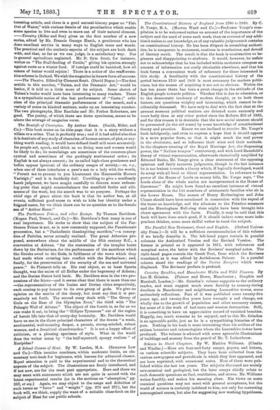The Parthenon Frieze, and other Essays. By Thomas Davidson. (Kegan
Paul, Trench, and Co.)—Mr. Davidson's first essay is one of real importance. He seeks to show that the subject of the Par- thenon Frieze is not, as is now-commonly supposed, the Panathenaic procession, but a "Panhellenic thanksgiving sacrifice,"—a concep- tion of Pericles, never actually realised. The great Athenian pro- posed, somewhere about the middle of the fifth century B.C., a convention at Athens, "for the restoration of the temples burnt down by the Barbarians, for the performance of the sacrifices which the Greeks owed to the Gods, in fulfilment of the vows which they had made when entering into conflict with the Barbarians; and, finally, for the preservation of the security of the sea and universal peace." So Plutarch tells us. His real object, so at least Sparta thought, was the union of all Hellas under the hegemony of Athens; and the Dorian States held back. Mr. Davidson sees in the two pro- cessions of the frieze—and it seems clear that there is more than one —the representatives of the Ionian and Dorian cities respectively, each coming to pay honour to its own group of gods. We give no opinion on the merits of the theory, but must say that it is per- suasively set forth. The second essay deals with "The Group of Gods on the Base of the Olympian Zeus," the third with "The Pelasgic Wall of Athens." The object of the fourth is, as far as we can make it out, to bring the " CEdipus Tyrannus " out of the region of heroic) life into that of every-day humanity. Mr. Davidson would have us see in the three principal characters of the drama "a weak, sentimental, well-meaning despot, a prosaic, strong-minded, robust woman, and a Jesuitical churchwarden." It is not a happy effort of criticism, or a pleasing specimen of style. What in the world does the writer mean by "the half-squeezed, spongy realism" of Euripides P


































 Previous page
Previous page